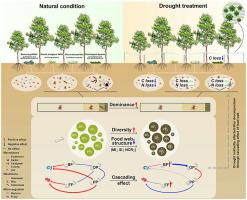当前位置:
X-MOL 学术
›
For. Ecosyst.
›
论文详情
Our official English website, www.x-mol.net, welcomes your feedback! (Note: you will need to create a separate account there.)
Litter quality and decomposer complexity co-drive effect of drought on decomposition
Forest Ecosystems ( IF 4.1 ) Pub Date : 2024-04-08 , DOI: 10.1016/j.fecs.2024.100194 Shumei Wang , Junwei Luan , Siyu Li , Jinhao Ma , Lin Chen , Yi Wang , Shirong Liu
Forest Ecosystems ( IF 4.1 ) Pub Date : 2024-04-08 , DOI: 10.1016/j.fecs.2024.100194 Shumei Wang , Junwei Luan , Siyu Li , Jinhao Ma , Lin Chen , Yi Wang , Shirong Liu

|
Litter decomposition is key to ecosystem carbon (C) and nutrient cycling, but this process is anticipated to weaken due to projected more extensive and prolonged drought. Yet how litter quality and decomposer community complexity regulate decomposition in response to drought is less understood. Here, in a five-year manipulative drought experiment in a Masson pine forest, leaf litter from four subtropical tree species ( Hook.f. & Thomson ex Miq., Willd., Lamb., Miq.) representing different qualities was decomposed for 350 d in litterbags of three different mesh sizes (i.e., 0.05, 1, and 5 mm), respectively, under natural conditions and a 50% throughfall rain exclusion treatment. Litterbags of increasing mesh sizes discriminate decomposer communities (i.e., microorganisms, microorganisms and mesofauna, microorganisms and meso- and macrofauna) that access the litter and represent an increasing complexity. The amount of litter C and nitrogen (N) loss, and changes in their ratio (C/N), as well as small and medium-sized decomposers including microorganisms, nematodes, and arthropods, were investigated. We found that drought did not affect C and N loss but decreased C/N (i.e., decomposer N use efficiency) of leaf litter irrespective of litter quality and decomposer complexity. However, changes in the C/N and the drought effect on C loss were both dependent on litter quality, while drought and decomposer complexity interactively affected litter C and N loss. Increasing decomposer community complexity enhanced litter decomposition and allowing additional access of meso- and macro-fauna to litterbags mitigated the negative drought effect on the microbial-driven decomposition. Furthermore, both the increased diversity and altered trophic structure of nematode due to drought contributed to the mitigation effects via cascading interactions. Our results show that litter quality and soil decomposer community complexity co-drive the effect of drought on litter decomposition. This experimental finding provides a new insight into the mechanisms controlling forest floor C and nutrient cycling under future global change scenarios.
中文翻译:

凋落物质量和分解者复杂性共同驱动干旱对分解的影响
凋落物分解是生态系统碳(C)和养分循环的关键,但由于预计更广泛和更长期的干旱,这一过程预计会减弱。然而,人们对凋落物质量和分解者群落复杂性如何调节分解以应对干旱的了解较少。这里,在马尾松林进行的为期五年的操纵性干旱实验中,代表不同品质的四种亚热带树种(Hook.f. & Thomson ex Miq.、Willd.、Lamb.、Miq.)的落叶被分解了 350 d 在自然条件下和 50% 渗透雨排除处理下,分别放入三种不同网眼尺寸(即 0.05、1 和 5 毫米)的垃圾袋中。网格尺寸不断增加的垃圾袋可区分进入垃圾并代表日益增加的复杂性的分解者群落(即微生物、微生物和中型动物群、微生物与中型和大型动物群)。研究了凋落物碳和氮(N)的损失量及其比值(C/N)的变化,以及微生物、线虫和节肢动物等中小型分解者。我们发现,无论凋落物质量和分解者复杂程度如何,干旱不会影响凋落物的碳和氮损失,但会降低凋落物的C/N(即分解者氮利用效率)。然而,C/N 的变化和干旱对 C 损失的影响均取决于凋落物质量,而干旱和分解者复杂性交互影响凋落物 C 和 N 损失。分解者群落复杂性的增加增强了凋落物的分解,并允许中观和大型动物群额外进入垃圾袋,减轻了干旱对微生物驱动的分解的负面影响。此外,由于干旱导致线虫多样性增加和营养结构改变,通过级联相互作用促进了缓解效果。我们的结果表明,凋落物质量和土壤分解者群落复杂性共同驱动干旱对凋落物分解的影响。这一实验结果为未来全球变化情景下控制森林地表碳和养分循环的机制提供了新的见解。
更新日期:2024-04-08
中文翻译:

凋落物质量和分解者复杂性共同驱动干旱对分解的影响
凋落物分解是生态系统碳(C)和养分循环的关键,但由于预计更广泛和更长期的干旱,这一过程预计会减弱。然而,人们对凋落物质量和分解者群落复杂性如何调节分解以应对干旱的了解较少。这里,在马尾松林进行的为期五年的操纵性干旱实验中,代表不同品质的四种亚热带树种(Hook.f. & Thomson ex Miq.、Willd.、Lamb.、Miq.)的落叶被分解了 350 d 在自然条件下和 50% 渗透雨排除处理下,分别放入三种不同网眼尺寸(即 0.05、1 和 5 毫米)的垃圾袋中。网格尺寸不断增加的垃圾袋可区分进入垃圾并代表日益增加的复杂性的分解者群落(即微生物、微生物和中型动物群、微生物与中型和大型动物群)。研究了凋落物碳和氮(N)的损失量及其比值(C/N)的变化,以及微生物、线虫和节肢动物等中小型分解者。我们发现,无论凋落物质量和分解者复杂程度如何,干旱不会影响凋落物的碳和氮损失,但会降低凋落物的C/N(即分解者氮利用效率)。然而,C/N 的变化和干旱对 C 损失的影响均取决于凋落物质量,而干旱和分解者复杂性交互影响凋落物 C 和 N 损失。分解者群落复杂性的增加增强了凋落物的分解,并允许中观和大型动物群额外进入垃圾袋,减轻了干旱对微生物驱动的分解的负面影响。此外,由于干旱导致线虫多样性增加和营养结构改变,通过级联相互作用促进了缓解效果。我们的结果表明,凋落物质量和土壤分解者群落复杂性共同驱动干旱对凋落物分解的影响。这一实验结果为未来全球变化情景下控制森林地表碳和养分循环的机制提供了新的见解。





























 京公网安备 11010802027423号
京公网安备 11010802027423号